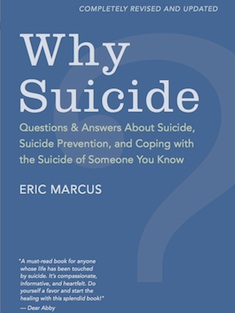
Today I have the pleasure of interviewing New York Times bestselling author Eric Marcus on the important topic of suicide. Eric is the author of several books, including “Is It A Choice?, Making Gay History,” and “Together Forever.” He is also co-author of “Breaking the Surface,” the #1 New York Times bestselling autobiography of Olympic diving champion Greg Louganis. For more information, please visit: www.ericmarcus.com and www.whysuicidebook.com.
Question: Why did you write “Why Suicide?”
Eric: When I started work on the original edition of “Why Suicide?” in 1987, I knew that I wanted to write the kind of book that I wish had been available to my mother when my father killed himself in 1970 so she would have known what to say a traumatized twelve-year-old boy. I also wanted to write the kind of book that would have been useful to me when I was 21 and just beginning to talk with a therapist about my dad’s suicide. I had so many questions and didn’t have a lot of answers. And I wanted to write the kind of book I could hand to my grandmother, who struggled for the rest of her life after my dad’s death with guilt and shame over his suicide. I also assumed that many people searching for answers about suicide have a short attention span like I do and preferred concise answers to their questions, which is why I wrote the book in a question and answer format and kept it short.
By the time I started work on the new edition of “Why Suicide?” in 2009, I’d unfortunately had more experience with suicide: my mother threatened suicide and had to be hospitalized and my sister-in-law attempted suicide and later went on to kill herself. Her shocking death was the inspiration for this new edition. So this second time around I had additional readers in mind. “Why Suicide?” now has a stronger focus on suicide prevention and the experiences of those who have lived through a suicide. Also, I like to think I approached the subject with more compassion and understanding than I did the first time, especially when it comes to dealing with people who are suicidal and the challenges of trying to help a suicidal person who doesn’t want help, which was very much the case with my late sister-in-law.
Question: Who is the book for?
Eric: “Why Suicide?” is for anyone searching for answers about the subject of suicide, whether they’re wrestling with their own thoughts of suicide, dealing with a loved one who is suicidal or has attempted suicide, or is trying to pick up the pieces in the aftermath of a suicide. It’s a basic introductory book that covers just about every possible question someone might have and I thread my own experiences and the stories of the people I interviewed through the entire book so that every reader should find a person and/or experience she or he can relate to. It’s a book that will be of special interest to anyone who has lived through the suicide of a loved one because I devote fully half the book to that subject in a chapter called “Surviving Suicide: Coping with the Suicide of Someone You Know.”

Question: What did you learn while working on the book?
Eric: I knew very little about suicide when I started researching the book, so I learned a lot. For example, I quickly learned that my experience wasn’t unique. More than three quarters of all Americans will be touched at some point in their lives by suicide, whether it’s the suicide of a friend, colleague, or family member. But there’s so much shame around suicide and so much stigma when it comes to talking about it that most people remain silent.
I also learned that when it comes to theories about suicide, whether we’re talking about explanations for why suicide rates are increasing or decreasing for a specific age group or why there are more suicides during the week than on the weekend, there is often conflicting information. There’s still a lot we don’t know. But above all, the most important thing I learned was that I wasn’t alone, which was a huge comfort. I thought that talking to other people who had been through the suicide of a loved one would be very, very difficult for me. And while it was often upsetting, there was something comforting about talking with people who had been through a similar experience.
Question: Is it easy for you to talk about the nature of your father’s death?
Eric: No, it’s never easy. But it’s gotten much easier over time because I’ve had so much practice and so many years of therapy. Still, there are rare occasions when I find myself getting emotional or I find I just can’t talk about it. Most memorably this happened a few years ago while we were on vacation in Mexico and made friends with a couple from Los Angeles. At dinner the second night, after we’d talked about everyone’s parents except for my dad, Molly said out of the blue, “Oh, we’ve never talked about your dad.” I was so caught off guard that instinctively–and, I think, out of embarrassment and fear and shame–I said, “My dad died young,” and changed the subject.
When we got back to our room after dinner my partner said, “What was that about?” He knew I felt strongly about the importance of being honest about what happened to my dad. I really couldn’t explain myself. I simply choked. So often when you disclose that a loved one died by suicide the conversation stops or people seem uncomfortable or they change the subject. So I always brace myself for the unexpected. When Molly caught me off guard I went into a defensive crouch without thinking.
So the next night at dinner, between courses, I apologized to Molly for being abrupt and changing the subject and then explained what happened to my dad and also explained that I’d written a book about suicide. Molly smiled and said that I’d have a lot to talk about with Tom, her husband, because his brother had taken his life, too. It turned out I was in very good and very supportive company and I would never have known it if I hadn’t “come out” about having had a suicide in my family. It would have been a missed opportunity.
Question: Why did your sister-in-law kill herself? How did you react?
Eric: My sister-in-law killed herself for the same basic reason that 90 percent of all people kill themselves. She was mentally ill. But of course her loved ones were left asking the same one-word question that just about everyone asks in the aftermath of a suicide: why? People who have lived through the suicide of a loved one are invariably hungry for answers to several key questions. Why did she do it? Why didn’t she come to us for help? What could I have done differently? Was it my fault? And on and on and on and on and on.
You can really make yourself crazy with the questions, especially since there are almost never satisfying answers. The “What if…?” and “If only…” questions are the worst. The biggest challenge I find is that when my mind wanders back to my sister-in-law’s suicide that I’m automatically trying to find a rational explanation for what she did. But you can’t find a rational explanation for an irrational act, so you wind up going in circles and exhausting yourself.
When I learned that my sister-in-law had killed herself I was shocked, but not surprised. She had attempted two years prior. But it was a very complicated situation because I felt it was my role to be a supportive spouse to my partner whose sister had just died, but given my history with suicide I was really struggling to just hold myself together. On top of that we were set to leave in two days on a long-planned trip to the Galapagos Islands to celebrate my 50th birthday. So instead of flying to Ecuador, we flew to the Midwest for a memorial service that my in-law family insisted had to be held immediately.
You may have noticed that I haven’t mentioned my sister-in-law’s name or mentioned the city where she lived. My in-law family is very unhappy with me speaking in any way about my sister-in-law and the nature of her death, so to protect their privacy I never identify her by name or talk about where she lived and died. My experience in this regard is not unique. In many families there are disagreements about how open to be about a loved one’s suicide. Given the work I do and my strong belief in the importance of speaking honestly about our experiences with suicide, it feels particularly awkward for me to not be completely open. If we can’t be open about our experiences we wind up reinforcing the stigma and shame that create such a burden for those left behind in the aftermath of a suicide. But I have to balance that belief with a respect for my in-law family’s wishes.
One of the things I did on the afternoon of the day I learned that my sister-in-law had taken her life was to trim a very high and slightly overgrown privet hedge in our backyard. In some ways I’m pretty typically male in my response to this kind of loss. I didn’t cry. I didn’t really want to talk. I just wanted to do something, but I was apparently more angry than I’d considered because by the time I got done with the hedge it was nothing but a row six-foot-tall naked stems and I was up to my knees in privet hedge branches. The hedge hasn’t yet come close to recovering, but it’s getting there.
Question: What do you say to a person who has lost someone to suicide?
Eric: It’s important to do something, whether you say it, write it, or do it. “I’m so sorry,” is a good start. A simple hug will also likely be welcome. A note. An offer to help, but if you offer to do something I suggest being specific, as in: “Can I baby-sit the kids?” “Can I make dinner for you one night this week?” “Can I pick your parents up at the airport?” If you’re going to offer to help I don’t think it’s enough to say, “Let me know if I can be of help.” People are often embarrassed to ask.
There are also definitely things you shouldn’t say, like “I know exactly how you feel. My cat just died.” I’m not making this up; someone I interviewed for the book had this experience with a colleague when she returned to work after her sister’s suicide. Unless you’ve been through a suicide yourself, never say that you know how someone who has been through a suicide feels because you don’t. But if you’ve been through a suicide yourself, by all means share that fact if it seems appropriate. People also often feel compelled to share religious beliefs, as in, “I’m afraid he’s going to hell for what he’s done.” This is something to discuss with your priest or religious advisor, not the bereaved, unless they’ve raised the subject themselves and want to discuss it with you.
In the case of a suicide, I think you can’t go wrong by sticking to the simplest gestures. The biggest mistake you can make is to pretend that nothing happened because the bereaved will take note and may find your failure to acknowledge their loss unforgivable.
Photo of Eric Marcus by Dixie Sheridan.
* Click here to subscribe to Beyond Blue and click here to follow Therese on Twitter and click here to join Group Beyond Blue, a depression support group. Now stop clicking.
